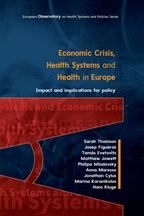
Financial crisis
How did health systems in Europe respond to the economic and financial crisis of 2009 and how did these responses impact on health system performance and population health? What lessons did we learn?
- how have health systems in Europe responded to the financial crisis?
- how have these responses impacted health system performance and population health?
- what are the implications of this experience for health systems facing economic and other forms of shock in the future?
- public funding for health the system;
- health coverage and health service planning;
- purchasing and delivery.
Financing and payment topics
Related publications

Economic crisis, health systems and health in Europe: impact and implications for policy
Economic shocks threaten health and health systems' performance by increasing people's need for health care and hindering access to care: a situation compounded...
The financial and economic crisis has had a visible but varied impact on many health systems in Europe, eliciting a wide range of responses from governments...
Economic crisis, health systems and health in Europe: impact and implications for policy
How have health systems in Europe responded to the crisis? How have these responses affected health system performance and population health? And what...
Ireland's recent financial and economic crisis – one of the most severe in the European Union – led to unprecedented reductions in levels of...
Health policy responses to the financial crisis in Europe
The global financial crisis that began in 2007 can be classified as a health system shock – that is, an unexpected occurrence originating outside...
Health systems and the financial crisis
The global economic crisis has affected most sectors, including the health sector. Although rather unpopular, some governments have responded with policies...
Subscribe to our newsletter
Sign Up